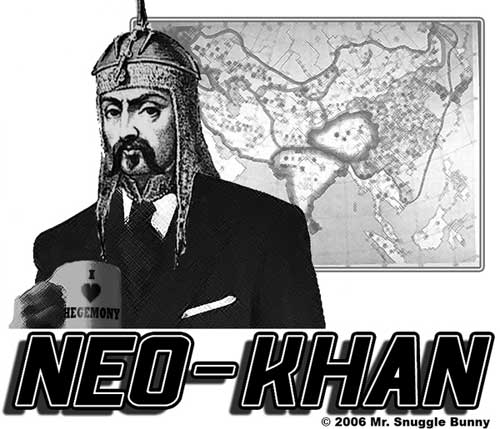
 | The Xenophile Historian |
THE HOLY BOOK OF UNIVERSAL TRUTHS,
K. U. P.
(Kimball's Unauthorized Perversion)

1. Whereas the typical Paleo-Con like Pat Buchanan or Charley Reese has probably been a conservative all his life, the Neo-Con may be a reformed liberal. That is the case with me; in my college days my views tended toward socialism, so you could say the star I hitched my wagon to was red. At some point disillusionment sets in, such an idealist realizes that good intentions aren't enough to change the world, and the rightward shift begins. You've probably heard the saying that "a conservative is a liberal who got mugged the night before." For me it started with Indochina after the communist triumph of 1975; the atrocities of the Pol Pot regime were obvious but ignored by most on the left, and the war that started up between Vietnam and Cambodia in the late 1970s showed me that a new ideology which preaches universal brotherhood cannot suddenly erase a thousand years of hatred and prejudice between two groups that have never gotten along. That is why one of my favorite columnists is David Horowitz, a repentant '60s radical.
In matters of religion a new convert can be a more zealous missionary than someone born and raised in the faith. If Neo-Cons act more noisy than Paleo-Cons, that's the reason.
2. Though not always the case, Neo-Cons tend to consider social and moral issues as being the most important, while Paleo-Cons tend to put economic issues (taxes and spending) first. It's really a matter of where your priority is, because otherwise we usually agree. That is why Barry Goldwater was not considered one of us, though he is often credited with saving conservatism in America.
3. The Israeli factor. Apparently this is the most obvious difference today between Paleo- and Neo-Cons; Neo-Cons support Israel while Paleo-Cons wish the Jewish state would go away. I think part of the reason for this stems from the fact that Israel's leadership has changed over time; from 1948 to 1977 the Labor Party ran everything over there. If your memory stretches that far back, you may recall that being pro-Israel was once the liberal thing to do. The late cartoonist Herbert Block ("Herblock"), for example, was a liberal who never missed an opportunity to draw Israel in a favorable light; only he could make Menachem Begin look better than he did in real life! The Labor Party has socialist roots, most visible in the "kibbutzim" established to reclaim the land, and for a while leftists hoped that they would turn Israel into a socialist or communist state. In fact, Joseph Stalin was friendly toward Israel as long as there was a chance that the Jewish state might slide into the Soviet bloc, and Israel was surrounded by conservative pro-Western Arab monarchies. Conversely, Harry Truman may have recognized the state of Israel as soon as he heard it had declared independence, but Israeli-US ties weren't very close until after the 1967 war. The transformation from that political balance to the one we see today began when Nasser overthrew King Farouk in Egypt, and over the next generation Nasser-style leftist regimes appeared in North Yemen, Iraq, Syria, Libya, Sudan, etc. I would say that Menachem Begin's election in 1977 completed Israel's change from being a liberal cause to a conservative one.
4. Along that line, let me make it clear that you don't have to be Jewish to be a Neo-Con. For the record, I'm not a Jew, though I'd be proud of my heritage if I was one. Those critical of the movement, or the current US administration, often use the terms "Jew" and "Neo-Con" interchangeably. For example, they might on one occasion assert that "the Neo-Cons got us into Iraq," and then next time say "the Jews got us into Iraq." That sounds like warmed-over anti-Semitism to me. Now plenty of Neo-Cons are Jewish, like the aforementioned David Horowitz, but not all Neo-Cons are Jews. There are two reasons why Jewish conservatives might concentrate in the Neo-Con movement: (a.) most of them are former liberals, since American Jews have a reputation for being overwhelmingly liberal, and (b.) the Paleo-Cons still won't have them.
5. An activist attitude toward the rest of the world. This is probably the most important difference between factions on the right. Whereas Paleo-Cons want to bring back that old-time isolationism, Neo-Cons see it as either impossible or impractical. In addition, Neo-Cons believe that the US can and should use its resources (money, armed forces, etc.) to make the world a better place. That idea probably came from the playbook of centrists like Henry "Scoop" Jackson, and "old left" liberals like Woodrow Wilson. At any rate, if there's a crisis somewhere, ask yourself the following questions:
a. Is an important US interest at stake?
b. Are people over there suffering from war or are they under a really bad tyrant?
Paleo-Cons will only get involved if you can answer "yes" to the first question. Liberals will intervene if you can answer "yes" to the second question, but not to the first (e.g., Haiti, Somalia and Yugoslavia). Neo-Cons are the most flexible here; either an important US interest or the issue of human rights can persuade them to act.
There, I hope that helps!
You are a Freedom Crusader, also known as a neoconservative. You believe in taking the fight directly to the enemy, whether itís terrorists abroad or the liberal terrorist appeasers at home who give them aid and comfort.
Take the quiz at www.fightliberals.com


Support this site!